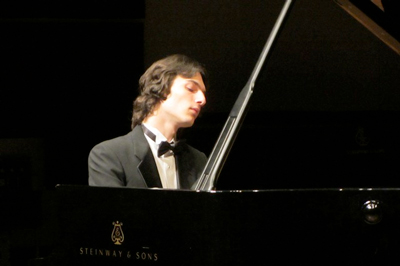by Daniel Hathaway

Neuhaus, who has distinguished pianists in his bloodline, displayed his impressive technique in two Liszt pieces from the second year of the composer’s “Italian Pilgrimage:” Spozalizio, inspired by Raphael’s Marriage of the Virgin, and Après une lecture du Dante: Fantasia quasi Sonata. Neuhaus handily captured the radiance of Spozalizio and the contrasting fates of the damned and the blessed in the Dante sonata, summoning up both tempests and moments of utter calm.
The pianist has quick hands and played dauntingly virtuosic passages with accuracy and spirit. But in Liszt’s more thunderous moments, Neuhaus’s exuberance overflowed to the point where hammers rang against the strings.
Adi Neuhaus rearranged the front end of his program, choosing to begin with Ferruccio Busoni’s 1893 “arrangement” of the Chaconne from J.S. Bach’s second violin partita. Busoni transforms Bach’s continuous variations into a more Romantic set of mini-movements with written-in tempo changes, performance instructions (at one point, “quasi Tromboni”) and lavish octave doublings.
Neuhaus took full advantage of Busoni’s re-envisioning of the work, playing dramatic chains of left-hand octaves with élan, using copious rubato and a lot of pedal. Beginning with Bach can be treacherous, and the pianist got caught in a few digital snares due to nerves, but he certainly seized everybody’s attention from the first notes of his recital.
Beethoven’s “Les Adieux” sonata (op. 81a) took a while to settle in. Blurred runs, rushed tempos and over-pedaling seemed also to have been symptoms of nerves. With those challenging openers behind him, Adi Neuhaus relaxed into Chopin’s Polonaise Fantasie, op. 61 and Scriabin’s Sonata Fantasie No. 2, op. 19, the two works that bracketed intermission. Here he tempered his tone and touch, his playing well-structured and expressive.
The audience, swelled by members of the Cleveland-Israel Arts Connection (a program of the Jewish Federation of Cleveland), gave Adi Neuhaus a warm ovation. He responded with a nuanced performance of a beautiful little Chopin Mazurka.
Published on ClevelandClassical.com March 30, 2015.
Click here for a printable copy of this article


